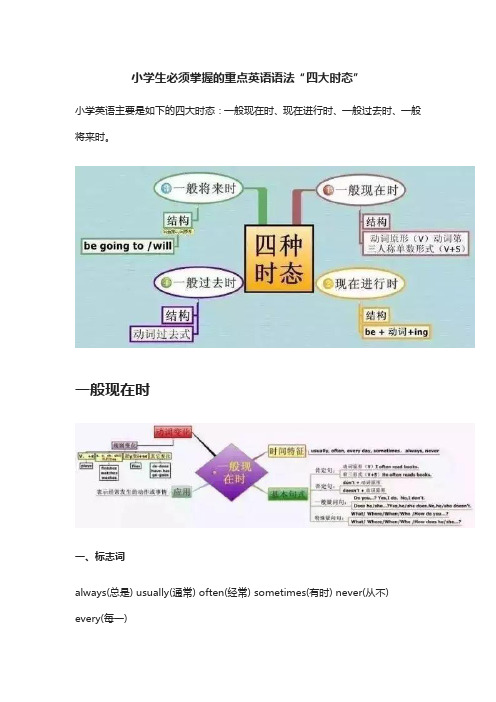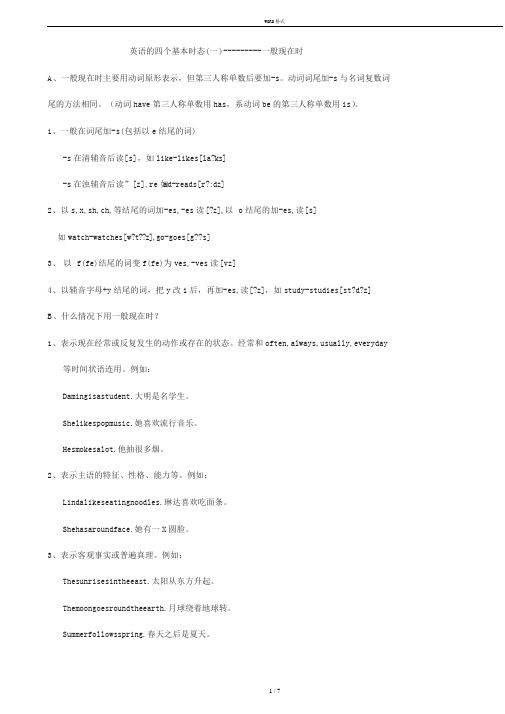小学英语语法及习题__四大基本时态
小学英语时态总结及练习题终版【精】

四大时态总结及练习你知道时态是什么意思吗?时态代表什么吗?小学英语就四个时态,你掌握了吗?时态用法例句时间状语一般现在时1、表示事物或人物的特征、状态。
2、表示经常性或习惯性的动作。
3.表示客观现实。
主语是三单:Theskyisblue.Hegetsupatsixeveryday.主语非三单:Theballoonsareblue.Igetupatsixeveryday.often一般过去时表示过去某个时间发生的动作或存在的状态。
Wereyouatschooljustnow?WhatdidJimdoyesterday?yesterday一般将来时1、表示将要发生的动作或存在的状态。
2及打算、计划或准备做某事。
Iwillgotoschooltomorrow.I’mgoingtohaveapicnicthisafternoon.tomorrow现在进行时现在进行时表示现在正在进行或发生的动作。
Areyousleeping?Whatareyoudoing?now时态动词变形名称动词变形规则各举一例一般现在时主语为第三人称单数时,动词变三单1. 一般情况下2. sh,ch,s,x,o结尾3. 结尾是辅音字母加y4.不规则动词havecookwashdostudy一般过去时动词变过去式 1. 一般情况下2. 动词结尾是e3. 重读闭音节辅元辅结构4. 结尾是辅音字母加y5. 不规则动词pulltastestopstudybe,see,get等等一般将来时begoingto+ will+现在进行时动词变动名词 1. 一般情况下2. 以不发音字母e结尾的动词3.重读闭音节辅元辅结构cookmakerun,swim英语语法中的时态(tense)是一种动词形式,不同的时态用以表示不同的时间与方式。
是表示行为、动作、状态在各种时间条件下的动词形式多加练习,百战不殆之时态一、选择最佳的答案:1.____Aliceoftenplaythepiano?No,she_____.A.Do;doB.Does;doesC.Does;doesn't2.___yourpenpal__inBeijing?A.Do;liveB.Do;livesC.Does;live3.TomandMike__veryexcited,theywilltakeatrip.A.isB.areC.am4.Ilike________verymuch.Whataboutyou?A.danceB.dancedC.dancing5.Thekite____abird.A.looklikeB.islookingC.lookslike6.BillandI___goodfriends.A.isB.areC.am7.Sandyoften___hishomeworkonSundays.A.doB.doesC.did8.Whatdoyouusuallydoontheweekend?I__________.A.wentswimmingB.goswimmingC.visitedgrandparents9.Whatdoyouusuallydoonyourholiday?Iusually__________.A.sawelephantsB.singanddanceC.tookpicture10.I____astudent.Igotoschool____buseveryday.A.is;byB.am;onC.am;by11.I____abrother.She____asister.A.have;hasB.has;hasC.have;have12.You____astudent.He____ateacher.A.is;isB.are;isC.are;are13.Healways_____footballgames.A.watchesB.watchC.doesn't14.Mybestfriend_____shells.A.collectsB.collectC.often15.Shedoesn’t_____listeningtothemusic.A.oftenB.likeC.likes16.MymotherandI___alwayswatchromanticfilms.A.doesn’tB.don’tC.do17.---When_____heusuallygethomeonFriday?----HeusuallygetshomeatfouronFriday.A.doB.doesC.did18,.Summer_________spring.esafteresinesbefore19.Everyone____totheirteacherintheclassroom.A.arelisteningB.islisteningC.listen20.Theyaresingingand___togetheratthepartynow.A.danceB.dancedC.dancing21.Listen!Thebirds____.A.issingingB.aresingC.aresinging22.Look!Thekite___inthesky.A.flyB.fliesC.isflying23.They____ridingaforse.A.isB.areC.am24.Kate____playingchess.A.amB.isC.are25.Areyouwashingclothes?A.Yes,youareB.Yes,IamC.No,Iam26.Ishe____TV?Yes,heis.A.watchB.watchingC.not27.____theytakingpictures.?Yes,theyare.A.AmB.BeC.Are28.It’s10o’clock.Ben_____TVinthebedroom.A.watchB.iswatchingC.watches29.I___presentsformyparentsyesterday.A.buyedB.boughtC.buying30.Susan_____swimmingyesterday.A.goB.goesC.went31.Danny_____breakfastfivetimeslastweek.A.eatB.ateC.eatedstSunday____TreePlantingDay.A.isB.wereC.was33.I____alotfromourtextbook.A.learnedB.learnesC.learning34.We____tothezooand___alotofanimalsyesterday.A.go;seeB.went;sawC.goes;sees35.Whatdidyoudolastweekend?--I_________A.readabookB.washtheclothesC.gofishing36.Whatdidyoudoonyourholiday?I________A.boughtapresentB.goskiingC.learnEnglish37.Whatdidhe_____yesterday?He____hishomework.A.did;didB.do;didC.do;do38.YesterdaymypresentsandI____ourhouse.A.werecleaningB.cleanedC.aregoingtoclean39.What_____totreesinthedifferentseasons?A.happenB.happensC.happenedstsummer.I____inthelakeandplayedonthebeach.A.swimB.swamC.willswim41.DidyoueatgoodfoodinChina?______.A.Yes,IdoB.No,Ididn’tC.No,Idid42.Weplayedbasketball_____.A.sometimesB.onSaturdaysstSaturday43.I’mgoingto___somechopsticks___Sundayafternoon.A.bought;onB.buy;onC.buy;on44.WhenareyougoingtoHongKong?I’mgoingthere____.A.thisweekendB.byplaneC.yesterday45.I’mgoingto____myfriendsthisweekend.A.visitB.visitedC.visiting46.I’mgoingto____homeworktomorrow.A.doesB.doC.did47.Areyougoingtotakeapianoclass?____A.No,wenotB.No,IamC.Yes,Iam48.Iam___eatbreakfastat7:15.A.willB.goingtoC.shall49.Wearegoingto____totheparktomorrow.A.goB.goesC.going50.Whatfilmareyougoingto______?A.seeB.watchC.look51.We_____aplaytomorrow.Willyoupleasejoinus?A.aregoingtoseeB.sawC.sees52.He___aracewithMingMing.A.shallhaveB.willhaveC.goingtohave53.Where_____yougotomorrow?A.areB.willC.shall54.___hisbrothergoingtoclimbmountains?A.IsB.AreC.Am55.Look!It_____.A.willsnowingB.isgoingtosnowC.snows56.I____freethisafternoon.A.beB.willbeC.goingtobe57.Theywill____roastducksinBeijing.A.ateB.eatsC.eat58.I__visitmyfriendsthisweekend.A.gotoB.amgoingtoC.goingto二、按照要求改写句子1.DanielwatchesTVeveryevening.(改为否定句)___________________________________________________2.Idomyhomeworkeveryday.(改为一般疑问句,作否定回答)________________________________________________________ 3.Shelikesmilk.(改为一般疑问句,作肯定回答)___________________________4.Amylikesplayingcomputergames.(改为一般疑问句,作否定回答)___________________________________________________5.Iliketakingphotosinthepark.(对划线部分提问)________________________________________________________ 6.JohncomesfromCanada.(对划线部分提问)___________________________________________________7.Nancyisgoingtogocamping.(改否定)??Nancy________goingtogocamping.1.I’llgoandjointhem.(改否定)??I_______go______jointhem.2.I’mgoingtogetupat6:30tomorrow.(改一般疑问句)??_______________________togetupat6:30tomorrow?3.Wewillmeetatthebusstopat10:30.(改一般疑问句)??_______________meetatthebusstopat10:30.4.Sheisgoingtolistentomusicafterschool.(对划线部分提问)??_______________she_________________________afterschool?5.Myfatherandmotheraregoingtoseeaplaythedayaftertomorrow.(同上) ??__________________goingtoseeaplaythedayaftertomorrow.1.Therewasacarinfrontofthehousejustnow.否定句:________________________________________________ 一般疑问句:____________________________________________ 肯、否定回答:__________________________________________ 肯、否定回答:__________________________________________一.按要求改写句子2.Theboyisplayingbasketball.否定句:____________________________一般疑问句:_________________________肯定回答:__________________________否定回答:__________________________对“isplayingbasketball”提问:__________________________对“Theboy”提问:__________________________3.Theyaresingingintheclassroom.否定句:____________________________一般疑问句:_________________________肯定回答:__________________________否定回答:__________________________对“aresinging”提问:__________________________对“intheclassroom”提问:__________________________三、用括号内动词的适当形式填空。
英语四大时态练习题.doc

英语四大时态练习题1)经常性、习惯性的动作或存在的状态。
句子常带有表示频率的时间状语:always , everyday , often , once a week , never, sometimes , seldom , usually 等等She doesn' t often write to her family, only once a month.她不常给家里写信,仅一月一封而已。
I cycle to work every day。
我每天骑自行车上班。
2)表示主语的特征、性格、能力、爱好等。
e.g. He can swim. I work hard. I like watching TV.3)表示客观真理e. g. There are seven days in a week. The moon moves round the earth.. The sun rises in the east。
日出东方。
Ten minus two is eight o十减二等于八。
Light travels faster than sound。
光的速度比声音的速度快。
The United States lies by the west coast of the Pacific Ocean.美国位于太平洋西岸。
4)根据英文语法规定,当主句的谓语动词是一般将来时,那么时间或条件状语从句的谓语动词只能用一般现在时来表示将来要发生的动作。
主句表将来,从句要用一般现在时。
例:I' 11 tell him the news when he comes back. 他回来时,我将告诉他这个消息。
If you take the job , they will talk with you in greater details。
如果你接受这份工作,他们将和你谈谈细节。
用于一般现在时的副词,除了上面提到的一些表示频率的以外,常见的还有:now, today , nowadays等等。
小学英语四种时态总结

小学英语四种时态总结英语语法中的时态是非常重要的一部分,正确使用时态可以使语言表达更加准确和清晰。
在小学英语学习阶段,学生们需要掌握四种基本的时态,它们分别是一般现在时、一般过去时、一般将来时和现在进行时。
下面将对这四种时态进行总结和归纳,希望能够帮助学生们更好地理解和掌握这些时态的用法。
一、一般现在时。
一般现在时表示的是经常性或习惯性的动作,或者是客观事实。
在句子中,一般现在时的动词形式不随主语的变化而变化,即动词用原形。
例如:1. I play football every Sunday.(我每个星期天都踢足球。
)。
2. She likes singing.(她喜欢唱歌。
)。
3. The sun rises in the east.(太阳从东方升起。
)。
二、一般过去时。
一般过去时表示的是发生在过去的动作或状态。
在句子中,一般过去时的动词形式通常是动词的过去式。
例如:1. I watched a movie last night.(昨晚我看了一部电影。
)。
2. They played basketball yesterday.(他们昨天打篮球。
)。
3. She lived in London for ten years.(她在伦敦住了十年。
)。
三、一般将来时。
一般将来时表示将来某个时间要发生的动作或状态。
在句子中,一般将来时通常使用助动词“will”或“shall”加上动词的原形。
例如:1. I will go to the park tomorrow.(我明天要去公园。
)。
2. She shall visit her grandparents next week.(她下周要去看望她的祖父母。
)。
3. We will have a party on Friday.(我们星期五要举办派对。
)。
四、现在进行时。
现在进行时表示现在正在进行的动作,或者是现阶段正在发生的动作。
在句子中,现在进行时的动词形式是“be”动词的现在分词形式。
小学英语语法及练习题

小学英语语法及练习题 LG GROUP system office room 【LGA16H-LGYY-LGUA8Q8-LGA162】小学英语基本语法及练习Contents第一章名词1.名词的数2.名词的格第二章代词1.人称代词2.物主代词第三章冠词与数词1.冠词2.数词第四章一般现在时态第五章现在进行时态第六章句型1.陈述句2.疑问句3.祈使句4.There be 句型与have\ has第七章总结考试第一章名词(Noun)名词的概念在生活中,我们会接触到各种各样的人和事物,用来表示这些人或事物名称的词就是名词。
一、名词的数名词的数指名词的单数和复数形式。
可数名词表示“一个”时用单数,“两个以上”时用复数;不可数名词表示量时,通常用“数词+单位+of+物质名词”的形式,如 a piece of bread (一片面包),变为复数时,只须将单位名词变为复数,如:two pieces of bread(两片面包)。
*名词复数的构成法则1. 一般情况下在词尾加s. 词尾读音shop --- shops (商店) 在清辅音后读 [ s ]bag --- bags (书包) 在浊辅音后读 [ z ]window --- windows (窗户) 在元音后读 [ z ]2. 以 s, x, sh, ch 结尾的单词在词尾加es。
class --- classes (班级) 词尾读音[ iz ]box --- boxes (盒子)match --- matches (比赛)brush --- brushes (刷子)3. 以“辅音字母 +y”结尾的词,变y为 i 加es.story --- stories (故事) 词尾读音[ iz ]4. 以“元音字母 +y”结尾的词,在词尾直接加 skey --- keys 词尾读音[ z ]monkey --- monkeys5.以“o”结尾的名词,复数一般在词尾加“s”, 但个别加“es”tomato --- tomatoes (西红柿) 词尾读音[ z ]potato --- potatoes (土豆)zoo --- zoos (动物园)photo --- photos (照片)*(以“o”结尾,复数加“es”)口诀:黑人(Negro)英雄(hero),左手拿着西红柿(tomato),右手拿着破土豆(potato),头顶一个大芒果(mango)。
小学生必须掌握的重点英语语法“四大时态”

小学生必须掌握的重点英语语法“四大时态”小学英语主要是如下的四大时态:一般现在时、现在进行时、一般过去时、一般将来时。
一般现在时一、标志词always(总是) usually(通常) often(经常) sometimes(有时) never(从不) every(每一)二、基本用法1.表示事物或人物的特征、状态。
2.表示经常性、习惯性的动作。
3.表示客观现实。
三、构成1.be动词:主语+be动词(am isare)+其它.2.行为动词:主语+行为动词+其它。
四、句型肯定句:A. be 动词:be+主语+其它。
B. 行为动词:主语+动词(注意人称变化)+其它。
否定句:A.be动词:主语+be+not+其它。
B.行为动词:主语+助动词(do/does)+not+d动词原形+其它一般疑问句:A.be动词:be+主语+其它。
B.行为动词:助动词(Do/Does)+主语+动词原形+其他.特殊疑问词:疑问词+一般疑问句现在进行时一、标志词now(现在), look(看),listen(听)二、基本用法表示现阶段正在进行的动作三、基本结构1.肯定句:主语+be动词+动词现在分词(ing)+其它。
2.否定句:主语+be动词+not+动词现在分词(ing)+其它。
3.一般疑问句:be动词+主语+现在分词(ing)+其它。
4.特殊疑问句:疑问词+一般疑问句。
一般将来时一、标志词tomorrow(明天),soon(不久),will(将要=be going to)二、基本用法表示在在将来某个时间要发生的动作或存在的状态。
三、基本结构1.肯定句:主语+ be going to + 动词原形。
主语+will+动词原形。
2.否定句:主语+ be going to +动词原形。
主语+won’t + 动词原形3.一般疑问句:Be + 主语+ going to+动词原形Will + 主语+ 动词原形4.特殊疑问句:疑问词+一般疑问句一般过去时一、标志词yesterday(昨天),ago(以前),before(在...之前)二、用法1.表示过去某个时间发生的动作或存在的状态,常和表示过去的时间状语连用。
小学英语语法----英语的四个基本时态(一)

英语的四个基本时态(一)---------一般现在时A、一般现在时主要用动词原形表示,但第三人称单数后要加-s。
动词词尾加-s与名词复数词尾的方法相同。
(动词have第三人称单数用has,系动词be的第三人称单数用is)。
1、一般在词尾加-s(包括以e结尾的词)-s在清辅音后读[s],如like-likes[la?ks]-s在浊辅音后读”[z],re如ad-reads[r?:dz]2、以s,x,sh,ch,等结尾的词加-es,-es读[?z],以o结尾的加-es,读[s]如watch-watches[w?t??z],go-goes[g??s]3、以f(fe)结尾的词变f(fe)为ves,-ves读[vz]4、以辅音字母+y结尾的词,把y改i后,再加-es,读[?z],如study-studies[st?d?z]B、什么情况下用一般现在时?1、表示现在经常或反复发生的动作或存在的状态。
经常和often,always,usually,everyday等时间状语连用。
例如:Damingisastudent.大明是名学生。
Shelikespopmusic.她喜欢流行音乐。
Hesmokesalot.他抽很多烟。
2、表示主语的特征、性格、能力等。
例如:Lindalikeseatingnoodles.琳达喜欢吃面条。
Shehasaroundface.她有一X圆脸。
3、表示客观事实或普遍真理。
例如:Thesunrisesintheeast.太阳从东方升起。
Themoongoesroundtheearth.月球绕着地球转。
Summerfollowsspring.春天之后是夏天。
4、表示安排或计划好的将来发生的动作。
例如:Wheredowegonow?我们现在要去哪里?The p l a net a k eso ff at 11:3011:30起飞。
C 、一般现在时的 1、陈述句(主语动词+其它) ①肯定形式:一般情况下动词用原形,当主语是第三人称单数时注意动词加-s 或-es ,例如: Ihaveapencilcase.我有一个铅笔盒。
小学六年级英语语法知识及时态练习题

【导语】语法就是语⾔的规律。
任何⼀种语⾔都有其内在逻辑性(logic)和规律(discipline)。
学习⼀些基本的英语语法,对于快速掌握英语语⾔的规律,具有事半功倍的作⽤,尤其是对于⼀些为考试⽽编的语法题句的理解,很有作⽤。
以下是⽆忧考整理的相关资料,希望对您有所帮助!【篇⼀】⼀般过去时态 (a) be 动词的过去式: I/He/she/it was(not)…. You/we/they were…. ⼀般疑问句was, were 放在句⾸。
(b) 动词过去式: 肯定句: I watched cartoons. She visited the zoo. ⼀般疑问句: Did you read book last night? Yes, I did. No, I didn't. Did she clean the desk just now? Yes, she did. No, she didn't. 否定句: They didn't go the the part yesterday. He didn't make model ships last week. (3)动词过去式的变化: 规则动词的变化: Most verbs +ed eg. planted,watered,climbed。
Verbs ending in e +d eg liked。
Verbs ending in a consonant +y --y +ied eg : study-studied Short verbs ending in a vowel + a consonant eg: stop --stopped 不规则动词的变化: is/am-was,are-were,do-did,have/has-had,make-made,fly-flew/u:/ eat-ate,take-took,run-ran,sing-sang,drink-drank 等等【篇⼆】 1. We __________ football when it began to rain. We had to stop and go home. (play) 2. Xiao Lin __________ from here for about two hours. (be away) 3.swheres__________? Can you find your birth place on the map? Sorry, I can't. (be born) 4. Last night we __________ back home until the teacher left school. (not go) 5. Comrade Li Dazhao __________ in prison in 1927. (put) 6. Where is professor Lee? He __________ to the library. He'll come back soon. (go) 7. We could not help __________ after we heard the story. (laugh) 8. Would you please __________ me an English-Chinese dictionary when you come? (bring) 9. He told me that he __________ the Great Wall the year before. (visit) 10. I'll tell him the news as soon as he __________ back. (come) 11. The boy __________ by the door is my brother. (stand) 12. Do you remember __________ the film last year? (see) 13. There __________ a physics test next Monday. (be) 14. __________ I finish my homework in class? (必须) No, you needn't. 15. I'm sorry you've missed the last bus. It __________ ten minutes ago. (leave)【篇三】 1. He __________ back a month ago. (come) 2. My mother often tells me __________ in bed. (not read) 3. I must take it back the day after tomorrow. You can only __________ it for 24 hours. (keep) 4. Why have you kept me __________ here for so long a time? (wait) 5. Please come to our meeting if you __________ free tomorrow. (be) 6. She __________ to the Great Wall several times. (go) 7. In his letter, he said that he __________ us very much. (miss) 8. The film __________ for nearly fifteen minutes when I got to the cinema. (be) 9. He said he became __________ in physics. (interest) 10. This film is worth __________. (see) 11. He went to school instead of __________ home. (go) 12. In the old days it was difficult for the poor to __________ a job. ( find) 13. It's cold outside, so you'd better __________ your coat. (put on) 14. He is hungry. Please give him something __________. (eat) 15. Please don't waste time __________ TV every evening. You should word hard at English. (watch) 16. We found the window __________. (break) 17. You have dropped your pencil. __________. (拾起它)。
小学英语语法四种时态练习

小学英语语法四种时态练习一、一般现在时练题(1)1.We often play in the playground.2.He gets up at six o'clock.3.Do you brush your XXX every morning?4.What does he usually do after school?5.XXX studies English。
Chinese。
Maths。
Science。
and Art at school.6.Mike sometimes goes to the park with his sister.7.At eight at night。
she watches TV with her parents.8.Does Mike read English every day?9.XXX?10.What time does his mother do the housework?改句子1.Do you often play football after school。
(Yes。
I do.)2.XXX.3.Gao Shan's sister doesn't XXX.4.Does she live in a small town near New York?5.Do you watch TV every day?6.Does David have a goal?7.We don't have four lessons.8.XXX.9.XXX.10.Does Mike have two letters for him? XXX.11.Do you usually play XXX?I don't usually play XXX.一、一般现在时练1.He often has dinner at home.2.Daniel and Tommy are in Class One.3.We do not watch TV on Monday.4.Nick does not go to the zoo on Sunday.5.Do they like the World Cup?6.What do they often do on Saturdays?7.Do your parents read newspapers every day?8.XXX.9.She and I take a walk XXX.10.There is some water in the bottle.二、现在进行时练1.I am looking for a shirt。
- 1、下载文档前请自行甄别文档内容的完整性,平台不提供额外的编辑、内容补充、找答案等附加服务。
- 2、"仅部分预览"的文档,不可在线预览部分如存在完整性等问题,可反馈申请退款(可完整预览的文档不适用该条件!)。
- 3、如文档侵犯您的权益,请联系客服反馈,我们会尽快为您处理(人工客服工作时间:9:00-18:30)。
小学英语语法及习题---四大基本时态一、一般现在时一般现在时基本用法介绍【No. 1】一般现在时的功能1.表示事物或人物的特征、状态。
如:The sky is blue.天空是蓝色的。
2.表示经常性或习惯性的动作。
如:I get up at six every day.我每天六点起床。
3.表示客观现实。
如:The earth goes around the sun.地球绕着太阳转。
一般现在时的构成1. beI am a boy.我是一个男孩。
2.We study English.我们学习英语。
当主语为第三人称单数(he, she,it)时,要在动词后加"-s"或"-es"。
如:Mary likes Chinese.玛丽喜欢汉语。
一般现在时的变化1. be动词的变化。
如:He is not a worker.他不是工人。
如:-Are you a student?-Yes. I am. / No, I'm not.Where is my bike?2.行为动词的变化。
I don't like bread.当主语为第三人称单数时,要用doesn't构成否定句。
如:He doesn't often play.- Do you often play football?- Yes, I do. / No, I don't.当主语为第三人称单数时,要用does构成一般疑问句。
如:- Does she go to work by bike?- Yes, she does. / No, she doesn't.How does your father go to work?动词+s的变化规则1.一般情况下,直接加-s,如:cook-cooks, milk-milks2.以s. x. sh. ch. o结尾,加-es,如:guess-guesses, wash-washes, watch-watches, go-goes3.以“辅音字母+y”结尾,变y为i, 再加-es,如:study-studies一般现在时用法专练:一、写出下列动词的第三人称单数drink ________ go _______ stay ________ make ________look _________ have_______ pass_______ carry ____come________ watch______ plant_______ fly ________study_______ brush________ do_________ teach_______二、用括号内动词的适当形式填空。
1. He often ________(have) dinner at home.2. Daniel and Tommy _______(be) in Class One.3. We _______(not watch) TV on Monday.4. Nick _______(not go) to the zoo on Sunday.5. ______ they ________(like) the World Cup?6. What _______they often _______(do) on Saturdays?7. _______ your parents _______(read) newspapers every day?8. The girl _______(teach) us English on Sundays.9. She and I ________(take) a walk together every evening.10. There ________(be) some water in the bottle.11. Mike _______(like) cooking.12. They _______(have) the same hobby.13. My aunt _______(look) after her baby carefully.14. You always _______(do) your homework well.15. I _______(be) ill. I’m staying in bed.16. She _______(go) to school from Monday to Friday.17. Liu Tao _______(do) not like PE.18. The child often _______(watch) TV in the evening.19. Su Hai and Su Yang _______(have) eight lessons this term.20. -What day _______(be) it today?-It’s Saturday.三、按照要求改写句子1. Daniel watches TV every evening.(改为否定句)___________________________________________________2. I do my homework every day.(改为一般疑问句,作否定回答)________________________________________________________ 3. She likes milk.(改为一般疑问句,作肯定回答)___________________________4. Amy likes playing computer games.(改为一般疑问句,作否定回答) ___________________________________________________5. We go to school every morning.(改为否定句)_______________________________________________________ 6. He speaks English very well.(改为否定句)___________________________________________________7. I like taking photos in the park.(对划线部分提问)________________________________________________________ 8. John comes from Canada.(对划线部分提问)___________________________________________________9. She is always a good student.(改为一般疑问句,作否定回答)________________________________________________________ 10. Simon and Daniel like going skating.(改为否定句)___________________________________________________四、改错(划出错误的地方,将正确的写在横线上)1. Is your brother speak English? __________________2. Does he likes going fishing? __________________3. He likes play games after class. __________________4. Mr. Wu teachs us English. __________________5. She don’t do her homework on Sundays. _________________二、现在进行时1.现在进行时表示现在正在进行或发生的动作,也可表示当前一段时间内的活动或现阶段正在进行的动作。
2.现在进行时的肯定句基本结构为:3.现在进行时的否定句在be后加not。
4.现在进行时的一般疑问句把be动词调到句首。
5.现在进行时的特殊疑问的基本结构为:但疑问词当主语时其结构为:动词加ing的变化规则1.一般情况下,直接加ing,如:cook-cooking2.以不发音的e结尾,去e加ing,如:make-making, taste-tasting3.如果末尾是一个元音字母和一个辅音字母,双写末尾的辅音字母,再加ing,如:run-running, stop-stopping现在进行时专项练习:一、写出下列动词的现在分词:play________ run__________ swim _________make__________go_________ like________ write________ _ski___________read________ have_________ sing ________ dance_________put_________ see________ buy _________ love____________live_______ take_________ come ________ get_________stop_________ sit ________ begin________ shop___________二、用所给的动词的正确形式填空:1.The boy __________________ ( draw)a picture now.2. Listen .Some girls _______________ ( sing)in the classroom .3. My mother _________________ ( cook )some nice food now.4. What _____ you ______ ( do ) now?5. Look . They _______________( have) an English lesson .6.They ____________(not ,water) the flowers now.7.Look! the girls ________________(dance )in the classroom .8.What is our granddaughter doing? She _________(listen ) to music.9. It’s 5 o’clock now. We _____________(have)supper now10.______Helen____________(wash )clothes? Yes ,she is .三、句型转换:1. They are doing housework .(分别改成一般疑问句和否定句)__________________________________________________________________________________________________________________________2.The students are cleaning the classroom . ( 改一般疑问句并作肯定和否定回答) __________________________________________________________________________________________________________________________________ 3.I’m playing the football in the playground .(对划线部分进行提问)_________________________________________________________________ 4.Tom is reading books in his study . (对划线部分进行提问)_________________________________________________________________三、将来时一、概念:表示将要发生的动作或存在的状态及打算、计划或准备做某事。
